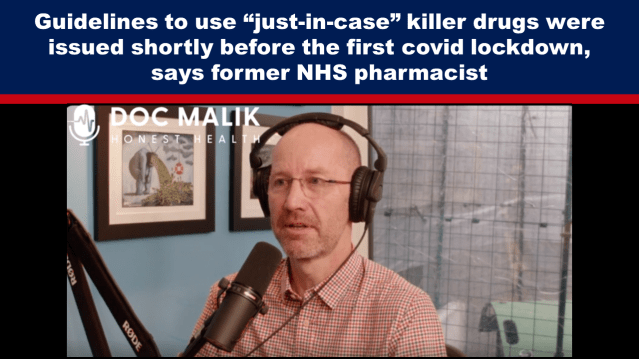Guidelines to use “just-in-case” killer drugs were issued shortly before the first covid lockdown, says former NHS pharmacist
At the start of the covid crisis, we were told there was a novel disease for which there was no treatment. Because of this, guidance was issued to put in place “just-in-case” drugs which commonly consist of five drugs including morphine, midazolam and other sedatives.
We killed people, Graham Atkinson said, “I watched while this happened.”
Let’s not lose touch…Your Government and Big Tech are actively trying to censor the information reported by The Exposé to serve their own needs. Subscribe now to make sure you receive the latest uncensored news in your inbox…
Graham Atkinson is a pharmacist with over 30 years of National Health Service (“NHS”) senior management experience, having worked at local, regional and national levels. He has been a Director of Commissioning in several Primary Care Trusts in the North West, has consulted for the pharmaceutical industry, worked in NHS national teams and has been a partner in a general practitioner’s practice. His successful NHS career came to a sudden end in October 2021 when he decided he could no longer participate in the Government’s response to the covid crisis. He is currently a team member of Project Lifeboat, a private membership forum for allopaths.
A couple of weeks ago he joined Doc Malik for an almost 3-hour discussion about the NHS, what he witnessed during the covid era, why he walked away from the NHS to build a naturally better model of healthcare that will make the existing system redundant and more.
We have embedded the video twice. Firstly, to begin at the timestamp where Atkinson talked about the “just-in-case” drugs. Secondly, at the timestamp when he spoke about treatments that should have been used, but weren’t. You can read an unedited transcript of the discussion HERE.
On the presumption that there would be covid outbreaks in several care homes, just before the first lockdown, in early March 2020, guidelines were issued to put “just-in-case” drugs in place, Atkinson told Doc Malik. The “just in case drugs” consist of morphine, midazolam and other sedatives.
“Lots of things changed nationally in early March: the death certification rules were changed, the cremation rules were changed and the NICE guidelines,” he said.
(Related: NHS Director confirms Hospitals lied about Cause of Death to create illusion of COVID Pandemic)
The key change was the NICE NG163 guideline, Atkinson said. “But it’s changed subsequently. They’ve removed the original guidelines. This is the guideline for people who have covid to help them die more comfortably; a good death.”
The National Institute for Clinical Excellence (“NICE”) is an executive non-departmental public body, sponsored by the UK Department of Health and Social Care (“DHSC”). It is an agency of the National Health Service (“NHS”) and develops guidance and recommendations on the effectiveness of treatments and medical procedures.
NG163 was updated and replaced with NG161 on 13 October 2020. A copy of NG163 has been archived on the Wayback Machine HERE.
(Related: UK Department of Health Advised Doctors to Use Midazolam as A Treatment for Covid)
What do the “just-in-case” drugs do to someone?
“It reduces your breathing. It renders you unconscious, first of all, and then there are drugs to reduce your anxiety before that,” Atkinson said.
“There are five drugs that are used that are commonly called the ‘just-in-case’ drugs. For years these have been used for cancer patients or maybe somebody with COPD, a respiratory disease, that are … struggling to breathe so they get very distressed just before they die. So, there’s drugs to help them feel less anxious about not being able to breathe, drugs to reduce their pain, drugs to relax them, and midazolam, as we know, takes away your consciousness,” he explained.
A person who is in a nursing home who has dementia or a cold or flu, say, when they are given these medications, “It’s going to progress you rapidly towards your final days because [your final days are] expected,” Atkinson said.
Atkinson explained that the narrative at the time was that covid was a novel disease and there were no drugs to treat it.
“We now know all this is false, but what was being told to clinicians at the time was this is a new novel disease. We don’t have any drugs that work. The only right care that you can administer for these patients is to ease their passing. Because this was the time when people were being put on ventilators and were expiring rapidly around the world. You know we were all seeing it on our TV,” he said.
“What actually happened in my area was that several residents in care homes were diagnosed – this is pre-PCR testing [and] they were diagnosed on the only evidence [there] was – the care home manager rang up and said, ‘Mary Smith’s got a cough and she’s looking not her normal self’. So, the doctor on the phone, cause remember we’re all working remotely [then], so the doctor on the phone says: ‘Probably covid, send the just-in-case drugs’.”
We killed people, Atkinson said.
“I watched while this happened. I expected as I said, 500 people in the first wave to die [according to what the narrative was saying]. But what actually happened was nobody died. There was no difference in our rates of death. In fact, we had outbreak after outbreak in our care homes and we expected it to spread like wildfire and there to be lots of coffins coming out [but that wasn’t the case].”
“So [ ] the care home outbreaks, nothing happened. It was a nothing burger. I had people in their 70s, 80s, 90s, patients being admitted to the respiratory covid ward in my hospital, a week later being discharged perfectly well … By probably two or three days before the first lockdown, I smelt a big rat,” Atkinson said. That’s when Atkinson knew that we’d been lied to by the government.
What absolutely cemented it for Atkinson was when he saw Matt Hancock in the House of Commons deny there was a link between vitamin D and covid survival.
“He said in the House of Commons that the government had commissioned research into vitamin D effectiveness in covid and there was no link,” Atkinson said. “The next day he had to go back and give a statement to Parliament and correct Hansard because he’d misled Parliament.”
“We haven’t done any research … there is no data and we all know absence of evidence isn’t evidence of absence. Clinically we all know that vitamin D levels in your blood, this is whether you treat somebody or not, but the vitamin D level in your blood prior to you getting ill is absolutely hugely important for your survival through whatever you’re going to get, but particularly for a respiratory illness,” he added.
Atkinson referred to a Spanish study that examined the levels of vitamin D in the blood of people being admitted to a hospital covid ward.
“I think the NHS is happy with 50; if your level’s 50 in your blood, happy days, it’s enough – [although] it’s not really enough – but 75, 100, 150 is better. But the [study] said that anybody who had a blood level over 80, I think it was 75 actually, over 75 they had an 80% chance of living. If their blood level was below 75, they had an 80% chance of dying. And I knew then that the treatments that would work for whatever covid was, but treatments that were evidence-based, were simple and cheap, were being systematically withheld and repressed from patients,” he said.
“And any clinician who dared speak those words, hydroxychloroquine, ivermectin, vitamin D, vitamin C, intravenous vitamin C – the Chinese were using it, we knew the Chinese were using it in March/April 2020 – I approached my local hospital, ‘maybe we should try this’. Absolutely not. Because to put your head above that parapet as a clinician meant blackballing. You were gonna be seriously taken out.
“If [a doctor] started prescribing ivermectin, hydroxychloroquine, vitamin D, intravenous vitamin C, you’d find somebody’s heavy hand on your shoulder very quickly.
“Why? Because if you’re going to subsequently give the emergency use authorisation for, and I hesitate to call it a vaccine, but let’s say you have an intervention that you need to bypass the normal regulatory approval and you need so it has to go through emergency use authorisation.
“So, we’ve got a novel disease – it was declared a novel disease – we have nothing that works, according to the government, and so therefore, because those two criteria are met, legally we can emergency use authorise this jab. And it’s still to this day emergency use authorised. They haven’t gone back and done it properly.”

This article has been archived for your research. The original version from The Exposé can be found here.



